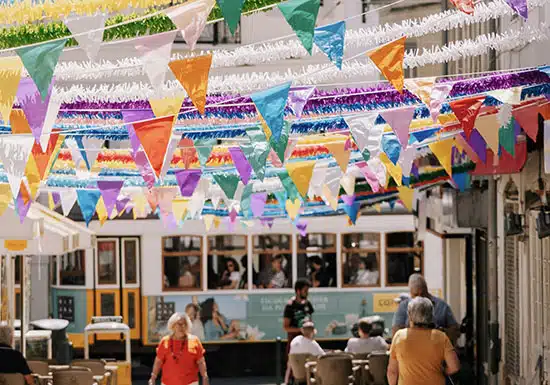Updated: January 26, 2026
Living in Lisbon has a lot to offer. The capital city of Portugal attracts many expats, mainly digital nomads, families, and young professionals. It offers relatively affordable living costs, a high quality of life, and a large tech community.
Most expats are drawn to the great weather, rich Portuguese culture, and excellent safety standards. While Lisbon may not have as many high-paying jobs as other major cities in Western Europe, everything else makes up for it. People are very welcoming, making it the perfect place to settle and raise a family.
Want to know where do most expats live in Lisbon? Then, you are in the right place. In this article, we will cover everything you need to know about life in Lisbon, from the best neighborhoods to the type of accommodations to choose from.
Read more about:
Key Takeaways about Living in Lisbon
- Lisbon is a good place to live for retirees, remote workers, young professionals, and families. A single person spends about €728 on monthly expenses, while a family of four budgets about €2,625 without rent.
- Expats who want a luxury often settle in Avenidas Novas, Chiado, or Príncipe Real, while those seeking more mid-range, family-friendly neighborhoods tend to gravitate towards Campo de Ourique or parts of Estrela.
- Young professionals and digital nomads often choose Príncipe Real, Bairro Alto, or Parque das Nações for the social scene and co-working spaces.
- Living in Lisbon means enjoying a vibrant city with historic charm. Housing costs have risen, so rent and property are less affordable than before, but food, transport, and entertainment are still cheaper than in many European capitals.
Lisbon Cheat Sheet
Quick facts about Lisbon | |
Population: | 3,040,920 |
Climate: | Mediterranean (mild winters and warm summers) |
Language: | Portuguese (official language), and other commonly used languages such as English, Spanish, and French |
Airport: | Lisbon Humberto Delgado Airport |
Best for: | Digital nomads, professionals, retirees, property investors, families with children |
International schools: | 36 |
Best neighborhoods: | Alvalade, Avenidas Novas, Bairro Alto, Campo de Ourique, Chiado, and Principe Real |
Best things to do and see: | Beautiful beaches, vibrant nightlife, historic sightseeing (St Jorge Castle, Belém Tower), and cultural attractions (MAAT, LX Factory) |
Why is everyone moving to Lisbon?
Lisbon is a popular choice for retirees, investors, digital nomads, young professionals, and families. But why are so many expats moving to Lisbon, Portugal?
Here are some of the key reasons to consider life in Lisbon, Portugal:
- Outstanding business and start-up hub: Lisbon is the best place in Portugal to do business. Based on the 2025 Global Startup Ecosystem Index, Lisbon has 498 active startup companies, three of which are valued at over €930 million. The annual ecosystem growth rate showed a 12.3 percent increase from April 2024 to April 2025.
- Good weather, stunning architecture, and gorgeous beaches: The incredible people, large coastline, and various parks make everyday life in Lisbon feel pleasant and relaxing. This major capital city often ranks among the favorite cities for expats because of the mild winter and welcoming local community.
- Flexible immigration process: Portugal makes it quite easy for foreigners to move to the country, with a range of visa options on the table.
- Affordable cost of living with high quality of life: Lisbon offers a great quality of life without the painful price tag of other European capitals.
Where to Live in Lisbon: Neighborhood Guide
If you consider living in Lisbon, find the right neighborhood that fits your lifestyle. Consider the local attractions, job opportunities, and schools. Every area is unique in its own way, from modern infrastructure to streets full of history.
So, where is the best place to live in Lisbon? Let’s break it down.
 1. Alvalade
1. Alvalade
Alvalade is one of the best places to live in Lisbon. It is a quiet residential neighborhood in the north-central part of Lisbon.
There is a mix of schools from local public ones to private international schools, with easy access to Lisbon’s business districts.
Living in Alvalade means you get access to a wide range of top restaurants, charming cafes, and green spaces. This neighborhood has many local attractions that cater to families, including the Jardim do Campo Grande Park.
You can enjoy life in Lisbon to the fullest, as the area is conveniently located close to the airport, making it a great choice for regular travelers and those who want to retire in Lisbon.
 2. Avenidas Novas
2. Avenidas Novas
Avenidas Novas might be considered one of the best neighborhoods in Lisbon to live in for an urban, luxury lifestyle. The wide streets are lined with beautiful houses. You can choose between emblematic and traditional buildings, or modern and contemporary design.
This neighborhood has one of the flattest areas in Lisbon, making it a safe place for daily life, whether riding bicycles or scooters.
With green spaces, cafes, an excellent public transport system, and easy access to the city’s nightlife areas, Avenidas Novas is becoming increasingly popular with expats in Lisbon.
The area combines residential and business hubs, with many professionals choosing to reside here due to its convenience and high quality of life.
Check our ultimate guide to learn more about best neighborhoods in Lisbon to live.
 3. Baixa
3. Baixa
Baixa is in Lisbon’s downtown area. Much of the neighborhood was rebuilt after the earthquake in the 18th century, so most of the architecture is in the Pombaline and neoclassical style.
One of the best things about living in Baixa is its strategic location. It is within walking distance of the nightlife center Bairro Alto, the historic Alfama district, the Castelo de São Jorge (Castle of St. Jorge), and Chiado. These are all key shopping areas and tourist destinations in the city.
When living in Lisbon as an expat, life in Baixa can feel busy, especially during the peak tourist season. This is a prime location, so rent and property prices are higher compared to other neighborhoods.
You can find out more about Baixa in our article for Baixa Lisbon real estate.
 4. Bairro Alto
4. Bairro Alto
Bairro Alto sits at the top of a hill and is one of Lisbon’s younger historic neighborhoods, developed in the 16th century.
If you enjoy living in an area filled with bars, cobblestone streets, and traditional Fado houses, then Bairro Alto is the place to be. By day, Bairro Alto feels quiet and peaceful, but by night, it becomes one of Lisbon’s nightlife hubs.
Lookouts like Miradouro de São Pedro de Alcântara provide panoramic views of the city, and you get easy access to Chiado, Príncipe Real, and Baixa.
 5. Campo de Ourique
5. Campo de Ourique
Campo de Ourique is located in a quiet corner of town. For many, it is one of the best places to live in Portugal for families, as it feels like living in a village right in the heart of the city.
The area has a mix of traditional and modern buildings and a strong sense of community. The quality schools, playgrounds, parks, and the local food market make it one of the best neighborhoods in Portugal to live in.
Another reason Campo de Ourique is a well-known Lisbon expat neighborhood is due to its proximity to cafés, shops, and restaurants. Overall, it is a great location for families, young professionals, and digital nomads.
If you want to research the local property market, check our guide to Campo do Ourique real estate.
 6. Chiado
6. Chiado
Chiado is in the center of Lisbon, right between Baixa and Bairro Alto. It is a convenient area in the city for daily life, famous for its charming cafés, theatres, bookstores, and cultural landmarks, including São Roque Church.
If you are wondering where do expats live in Lisbon, Chiado is a popular choice because it is elegant, modern, and busy. It combines historical architecture with upscale living and excellent transportation links.
 7. Príncipe Real
7. Príncipe Real
Príncipe Real is a wealthy neighborhood in central Lisbon. It is filled with large mansions, popular restaurants, antique shops, and leafy boulevards.
If you are interested in living in Lisbon as an American, Príncipe Real is a great choice for high-end properties and luxury shopping in Portugal.
The area is popular with digital nomads, young professionals, couples, and LGBTQ+ residents. Even actress Scarlet Johansson snapped up an apartment there. If you are interested in buying property here, check our article on real estate in Príncipe Real.
How much does it cost to live in Lisbon?
 The cost of living in Lisbon is significantly more affordable than in some other European capitals such as Paris, Madrid, and London. A couple can live a comfortable life on €2,500 to €3,200 per month, which covers groceries, rent, and eating out.
The cost of living in Lisbon is significantly more affordable than in some other European capitals such as Paris, Madrid, and London. A couple can live a comfortable life on €2,500 to €3,200 per month, which covers groceries, rent, and eating out.
If you are considering living in Lisbon as an American, the monthly rent in the Portuguese capital is 45.3 percent lower than in Washington DC, 65 percent cheaper than in New York, and 53.6 percent more affordable than in San Francisco.
Overall, the expenses of living in Portugal are lower than in many other countries, such as the USA, UK, Ireland, Scotland, France, Germany, and neighboring Spain. However, the cost of living significantly varies based on the area you choose.
For example, prices in the interior regions are more affordable compared to city centers and neighborhoods close to local tourist attractions. Although Lisbon is an expensive city in Portugal, living here is worth it because of its high quality of life.
In the Global Citizen Solutions’ Quality of Life Index, Portugal ranks in sixth position. This means that the country is one of the best places to live in for those looking for affordable costs, quality healthcare, education, vibrant culture, and a safe city to settle in.
How much do I need to live in Lisbon?
In Lisbon, the estimated cost for a family of four is about €2,625 per month, excluding rent, while, for a single person, you could get by with €728 per month in Lisbon, also not including rent. This is according to the latest figures from Numbeo.
Food in Lisbon
Lisbon offers high-quality, affordable food options. While prices have been increasing recently, they remain affordable compared to prices in other European capital cities.
Here’s an example of the average grocery prices for popular products:
Product | Price (€) |
Milk (regular) (1 liter) | 1.01 |
Fresh white bread (500 g) | 1.58 |
Rice (white) (1 kg) | 1.44 |
Eggs (regular) (12) | 3.24 |
Chicken fillets (1 kg) | 6.97 |
Apples (1 kg) | 1.87 |
Tomatoes (1 kg) | 2.06 |
Potatoes (1 kg) | 1.59 |
Water (1.5 liters) | 0.73 |
Source: Numbeo
Eating out in Lisbon
Portugal is renowned for its exceptional food and wine, especially fresh seafood. You can enjoy fine dining without the high price tag of other countries, such as Switzerland, Norway, and Iceland.
You can purchase a quality meal in Portugal for under €20 and easily eat out a couple of times a week or a month, depending on your budget.
The average costs for dining out in Lisbon include:
- A meal in an inexpensive restaurant: €13.75
- A meal in a mid-level restaurant (two people, three courses): €50
- Cappuccino: €2.29
- A bottle of mid-range wine: €5
- Domestic beer (0.5 liter): €3
Transportation in Lisbon
In Lisbon, you can buy a monthly transportation pass that will cost you €40. This is a really good deal because you will be able to use all the means of transportation in the city, such as a bus, train, or metro. A one-way ticket with local transport costs €2.
Lisbon International Airport also has flights across the world. If you are looking for a weekend getaway, you will find many cheap flights available, particularly if you book well in advance.
Finding Accommodation in Lisbon
Real estate in Lisbon is booming, and although property prices have increased rapidly over the past years, there are many parts of the city where you can still get a good deal. If you are considering buying property in Lisbon, it can be a smart move, as your property will likely increase in value over time.
 Buying a house in Lisbon
Buying a house in Lisbon
 It’s easy to buy a house in Lisbon. Lisbon real estate prices will vary considerably depending on the neighborhood you choose. There are many property types for different budgets, from modern apartments to spacious waterfront houses.
It’s easy to buy a house in Lisbon. Lisbon real estate prices will vary considerably depending on the neighborhood you choose. There are many property types for different budgets, from modern apartments to spacious waterfront houses.
However, this is the most expensive city in the country, so expect to pay premium prices for real estate investments in Lisbon. The average asking price for property in Lisbon is €6,934 per square meter, while if you look at the Lisbon Metropolitan Area, this falls to €4,935.
Lisbon land for sale is more affordable than buying a property, and, although it will take time to build your dream home, you’ll be able to customize it to your personal tastes. As there is no one ultimate property listing site, it can be a good idea to work with a buyer’s agent, such as Goldcrest.
With €3 billion being invested into Marvila in the next ten years, a Marvila real estate investment can be an excellent strategy as the area transforms into one of the prime Lisbon neighborhoods.
 Renting a house in Lisbon
Renting a house in Lisbon
Lisbon’s rental market is highly competitive due to strong demand from expats. So, it is highly recommended to find rental apartments before you move there. A buyer’s agent can provide property search services in any neighborhood you select and compare the rental prices.
The average prices for renting a property in Lisbon include:
- One-bedroom apartment in the city center: €1,375.93
- One-bedroom apartment outside of the center: €1,039.58
- Three-bedroom apartment in the city center: €2,469.05
- Three-bedroom apartment outside of the center: €1,676.19
You can find short-term rentals on platforms such as Airbnb and Booking.com. However, if you decide to move to Lisbon and rent long-term, you can use local sources such as Facebook groups and rental listing websites.
How to Live in Lisbon as an Expat: Residence Permits and Visas
Planning to relocate to Lisbon? If you are moving to Portugal, you will need to get a Portuguese NIF number (tax identification number) as soon as possible, as you will need it for any major financial transactions.
You can apply for a NIF number at a local tax office (Finanças) or citizen service hubs (Loja do Cidadão). We also recommend that you set up a Portuguese bank account to mitigate international fees or pay property taxes.
Here are the different pathways for securing residency in Portugal.
 Living in Lisbon as an EU citizen
Living in Lisbon as an EU citizen
If you are an EU citizen hoping to join the many Lisbon expats, the country has a smooth immigration process. As part of the European Union, you can freely move between member countries, including Portugal. To move to Lisbon and stay longer than three months, simply apply for the registration certificate, also known as Certificado de Registo de Cidadão da União Europeia (CRUE), at your local council office.
 Living in Lisbon as a non-EU citizen
Living in Lisbon as a non-EU citizen
If you’re a non-EU citizen considering living in Lisbon, there are various visa options you can apply for to enter and live in Portugal.
Once you obtain a visa to travel to Portugal, you will need to apply for a residence permit to settle in Lisbon, Portugal, and enjoy the benefits of being a resident.
Below are some popular pathways for non-EU nationals to secure residency in Portugal. Note that this list is not exhaustive; several other visa types are available to non-EU citizens.
If you are considering relocating to Portugal, our residency and citizenship division, Global Citizen Solutions, would be delighted to assist you in discussing which option is best for your needs.
 Portugal Golden Visa
Portugal Golden Visa
The Portugal Golden Visa is one of the most common visa programs for non-EU citizens who invest in Portugal through fund investments, donations, or company formation. The Portugal Golden Visa program provides a pathway for non-EU investors to obtain a Portuguese residence permit by making a qualifying investment in the country (a minimum investment of €250,000 is required). However, the program no longer provides real estate investments as a pathway to residency.
 D2 Visa Portugal
D2 Visa Portugal
The D2 Visa Portugal is perfect for entrepreneurs and small business owners who want to set up shop in Portugal. Whether you’re opening a café, launching a startup, or investing in a local company, this visa allows you to obtain residency while growing your venture. It applies anywhere in Portugal, including Lisbon, and requires a viable business plan and investment in the Portuguese economy.
 D3 Visa Portugal
D3 Visa Portugal
The Portugal D3 Visa is a work visa for highly skilled professionals who already have a job offer or employment contract in a qualified field in Portugal. You can use it to move to Portugal and get a residence permit based on your job. Many applicants who qualify under the D3 category may also be eligible to apply for an EU Blue Card, which provides broader rights to live and work in other EU countries.
 D7 Visa
D7 Visa
The Portugal D7 Visa is for non‑EU citizens with stable passive income who want to live in Portugal. It’s a popular option for retirees, pensioners, and individuals with regular income from sources like rental properties, investment dividends, pensions, or intellectual property.
To qualify, you must demonstrate consistent passive income that is over the Portuguese minimum wage, which for 2026 is €920 per month. You can apply for a residence permit after the immigration authorities approve your visa.
 Digital Nomad Visa
Digital Nomad Visa
The Portugal Digital Nomad Visa (D8 Visa) was launched in late 2022 to allow non‑EU remote workers to live in Portugal while working for clients or employers outside the country.
To qualify, applicants must show a stable remote income that is at least four times the Portuguese minimum wage (at least €3,680 per month in 2026) and the income must come from outside Portugal. In Lisbon, there are many coworking spaces for working remotely in Portugal that cater to digital nomads.
Finding a Job in Lisbon
 Wondering if you can find a job as an expat in Lisbon? Foreigners can find work in large industries, such as technology, tourism, and customer service.
Wondering if you can find a job as an expat in Lisbon? Foreigners can find work in large industries, such as technology, tourism, and customer service.
The job market in Lisbon is stable with a 6.3 percent unemployment rate, based on the latest 2025 reports from Statistics Portugal (INE).
Although average salaries are often lower than in other Western European countries, the lower cost of living can offset this. If you speak one or multiple foreign languages, you can find plenty of job opportunities in international companies, especially in Lisbon’s booming startup scene.
On that note, the job market in Lisbon is growing, especially in tech, tourism, and customer service. Overall, people earning local salaries often choose to live in interior areas, rather than the city center, to accommodate the rising costs.
As for remote workers, Lisbon has everything you could need: affordable living, a strong expat network, and plenty of coworking spaces and cafés with excellent Wi-Fi. Plus, with beaches just a short train ride away, it’s easy to enjoy your day while balancing work time.
Taxes in Lisbon
 If you live in Lisbon or anywhere in Portugal for more than 183 days a year, the Portuguese government considers you a tax resident. You must register as a taxpayer and get your NIF at your local tax office.
If you live in Lisbon or anywhere in Portugal for more than 183 days a year, the Portuguese government considers you a tax resident. You must register as a taxpayer and get your NIF at your local tax office.
Resident income tax rates range from 12.5 percent to 48 percent, while non-residents pay a flat 25 percent on income earned in Portugal. Property owners also pay local taxes, such as IMI (municipal property tax) and IMT (property transfer tax). To find out more about the IRS (income tax), check our ultimate guide about taxes in Portugal.
Portugal used to offer the Non-Habitual Residency (NHR) tax regime for foreign residents, but it no longer accepts new applications. It will be replaced by the Portugal NHR 2.0 (Tax Incentive for Scientific Research and Innovation).
Opening a Bank Account in Lisbon
Opening a Portuguese bank account is generally straightforward once you have a NIF (Portuguese tax identification number). Most banks require a passport (or ID), proof of address, and an initial deposit of between €250 and €300, depending on the bank and account type.
The Central Bank of Portugal regulates the country’s banking system based on strict EU standards. The Multibanco network connects thousands of ATMs nationwide, which you can use to pay your bills, transfer or withdraw money, and perform other everyday banking services.
To open a bank account in Lisbon, you need to:
- Choose an international bank and a local branch
- Gather required documents
- Visit the branch or begin the process online
- Select a current or savings account
- Make an initial deposit if required
Some banks, such as Novo Banco, ActivoBank, and Millennium BCP, may allow the process to start online, but may require a video call or follow-up verification. You can read more about these financial institutions in our article about banking in Portugal.
Schools in Lisbon
As an expat parent, there is no need to worry about your child’s education while considering moving to Portugal.
According to the International School Database, there are a total of 36 different international schools in Lisbon, all offering high-quality education and extracurricular activities. The average annual budget for an international primary school is €13,655.
Here are some of the most popular ones:
- British School of Lisbon
- Oeiras International School
- Astoria International School
- Redbridge School
- Lycée Français Charles Lepierre
As a legal resident of Lisbon, you can also enroll your children in a public school, which is free, but you should know that Portuguese is the main language used in public schools.
Also, if you are moving to the capital and are looking for schools, you can consult our article on international schools in Lisbon.
Getting Around in Lisbon
In Lisbon, you can easily explore the city by walking. Public transportation is quite affordable, with a one-way ticket for a bus, tram, or a metro line costing about €2. If you plan to travel regularly across the wider metropolitan area, you can spend about €40 on a regular monthly ticket pass with local transport.
Taxi rides are particularly cheap with a €3.50 standard tariff or €0.90 for a kilometer ride. You can also book an Uber or Bolt to move between parts of the city, which is even more affordable given the average gasoline price of €1.78 per liter.
Healthcare in Lisbon
Portugal’s healthcare system has public and private networks. The public SNS (Serviço Nacional de Saúde) is available to legal residents and expats with residency. It covers family doctor visits, hospital care, emergency services, maternity care, and specialist treatment. Public medical services are quite affordable with low co-payments.
However, due to the long waiting times and limited choice of English-speaking doctors, many expats choose to combine both public and private healthcare. Private medical insurance is significantly cheaper than in the United States and can cost anywhere from €400 to €1,000 yearly, based on the coverage. CUF, Luz Saúde, and Lusíadas Saúde all have private healthcare facilities in Lisbon, and they are among the main private hospital networks used in the city.
Language in Lisbon
Although the official language in Portugal is Portuguese, you will usually find someone who speaks English in the capital, especially near Lisbon tourist attractions, hospitals, bars, and restaurants.
According to the new EF English Proficiency Index (EF EPI), which covers 100 countries and regions worldwide, Portugal ranks sixth among non-native speakers for English proficiency. You should know that English is extensively spoken in Lisbon compared to other Portuguese cities.
However, learning Portuguese will help you integrate into your new neighborhood and immerse yourself in the Portuguese way of life. In government offices, you may find English is not so widely spoken, making it a good idea to learn Portuguese.
Weather in Lisbon
If you’re a nature lover dreaming of plenty of sun and warm weather, Portugal is a great choice. Lisbon enjoys a Mediterranean climate with warm, dry summers and mild, wetter winters. Compared with many Northern European cities, Lisbon still gets plenty of sunshine during the winter months, around five to six hours of bright sunshine per day in December and January.
The hottest month is August, with an average temperature of 29°C (84.2°F), and the coldest month is January, with an average temperature of 14.3°C (57.7 °F). November is the wettest month, with a lot of rain. Overall, the comfortable, mild climate is a big part of why many expats choose to live in Lisbon.
Things To Do in Lisbon
There are plenty of things to do in Lisbon, from visiting the local beaches, enjoying the vibrant nightlife, to tasting the traditional Portuguese cuisine. The city also hosts a wide range of festivals throughout the year.
Visit the beautiful beaches
One of the best things about Lisbon is the nearby beaches. Just a short train or car ride away, you can find yourself in Carcavelos for surfing, Guincho for dramatic coastal views, or Costa da Caparica for a laid-back beach day with fresh seafood restaurants nearby.
Enjoy the vibrant nightlife
Lisbon really comes alive at night, with a scene for every taste and friendly Portuguese people. Start with sunset drinks at one of the city’s stunning rooftop bars, then head to Bairro Alto for lively streets full of bars, clubs, and live music. This is an amazing country where you can easily meet new friends. You can find out more in our article on Portugal’s nightlife.
Explore the arts and culture
Lisbon is a creative city filled with history and modern artistic energy. Wander through the MAAT for cutting-edge exhibitions, visit the Berardo Collection Museum for contemporary art, or explore the historic Calouste Gulbenkian Museum.
Want to know where LGBTQ+ travelers go when they visit Portugal? Check our article on the best gay areas in Lisbon.
Try the local cuisine
Portuguese food is all about bold flavors and fresh ingredients. Trying a pastel de nata (custard tart) is a non-negotiable while in the city. Then, once you’re feeling up for other traditional dishes, you could try bacalhau à brás (salt cod dish) or polvo à lagareiro (roasted octopus).
Don’t forget to try a glass of ginjinha, Lisbon’s famous cherry liqueur, best enjoyed in a tiny hole-in-the-wall bar. You’ll find many of these bars around Rossio Square.
Experience festivals and attractions in Lisbon
 While living in Lisbon, you will experience various live events around the year, such as art exhibitions, film and food festivals, concerts, and others. Some popular Lisbon live events are:
While living in Lisbon, you will experience various live events around the year, such as art exhibitions, film and food festivals, concerts, and others. Some popular Lisbon live events are:
- New Year’s Concert: Like every big city in the world, Lisbon also welcomes the new year with grandeur. A grand concert is held on the evening of 1 January every year.
- Lisbon Carnival: The month of February sees excited party-goers crowding the streets of Lisbon.
- Santo António Festival: This festival lights up the city, with locals and visitors flocking to the streets to celebrate by eating grilled sardines and partying until dawn.
- Lisbon Pride: This is a must-experience event for the LGBTQIA+ community and supporters in Lisbon. Picture the streets filled with music, colorful floats, and an electric atmosphere, ending with parties across the city.
- Other festivals and events: You will also find countless festivals taking place throughout the year, from summer Jazz festivals to the latest stars frequenting festivals such as SuperBock SuperRock, and MEO Kalorama Lisboa.
- Golfing: The golf scene in and around Lisbon for keen golfers is incredible. Lisbon and the Lisbon Coast’s great golf courses are amongst the best in the world.
Is Lisbon safe?
Portugal is the seventh most peaceful country in the world, according to the 2025 Global Peace Index and the crime rate in Lisbon is very low. Lisbon expats enjoy a calm, relaxed lifestyle, and Portuguese nationals are very friendly towards foreigners.
Pros and Cons of Living in Lisbon
Like every city in the world, Lisbon has its pros and cons. We’ve narrowed down some of Lisbon’s advantages and drawbacks so you will be able to see the whole picture clearly before deciding whether moving to Lisbon is for you.
 Pros of living in Lisbon
Pros of living in Lisbon
- Affordable cost of living compared to other major European cities
- Pleasant climate
- Historic neighborhoods boasting incredible architecture
- Booming business center
- Beautiful beaches and lovely sightseeing with a large variety of things to do
- Various schools and education options
- Great social life
- For a big city, Lisbon retains a community feel in many neighborhoods
- Lisbon is a good place for remote workers to live, given the excellent infrastructure, co-working spaces, and reliable internet.
 Cons of living in Lisbon
Cons of living in Lisbon
- The steep hills and cobbled streets can be quite a workout
- Portuguese bureaucracy can be slow
- Overtourism in summer
- Challenge to find rental apartments, which also increases the rent prices
- Limited central heating in winter for older buildings
How can Goldcrest help you?
If you are planning to live in Lisbon and buy your dream property anywhere in Portugal, Goldcrest can help you research the local real estate market, negotiate prices, and simplify the entire purchasing process.
We are a team of buyer’s agents with years of experience in Lisbon real estate investments. We also provide property management for long-term rentals, which can be highly beneficial if you have a holiday home that earns you a passive income.
Our team has a wide network of local experts, such as contractors, real estate lawyers, and tax advisors. Contact us today and let us help you find the perfect Lisbon neighborhood to live in.
Frequently Asked Questions about Living in Lisbon
Is Lisbon Portugal a good place to live?
Lisbon is a great place to live, with a pleasant climate and a number of beautiful beaches on your doorstep. Additionally, Lisbon is a very affordable city compared to many major cities in other European countries.
Is it expensive to live in Lisbon?
The cost of living in Portugal is way much lower than in many countries, such as the UK, Ireland, Scotland, France, Germany, and neighboring Spain. Hence, Portugal is one of the most affordable countries in Western Europe, especially for expats and digital nomads.
Where to live in Lisbon?
Where you choose to live in Lisbon depends on the vibe you are after. Baixa and Chiado are perfect for first-timers, while Príncipe Real is about luxury. Alfama is steeped in history, and Bairro Alto has quite the nightlife. For a family life, look at Avenidas Novas and Alvalade.
Can you live in Lisbon as an American?
Yes, Americans can live in Lisbon! The welcoming atmosphere of Portugal’s capital and many different visa options make it relatively easy for Americans to relocate here. Whether you’re considering new job opportunities, a change of scenery, or living in retirement homes in Lisbon, Portugal, there is something here for everyone. While prices are on the rise, Lisbon is an affordable city compared to many other European cities.
How can you move to Lisbon as a foreigner?
You can get residency through the AIMA (Portugal’s immigration agency) by applying for any of the available pathways. The most popular options are the D7 (passive income visa), D8 (digital nomad visa), D2 (entrepreneur or business investor visa), family reunification visa, or the Portugal Golden Visa.
Where do most American expats live in Portugal?
While American expats can be found throughout Portugal, certain areas tend to attract more expats than others. Living in Lisbon, the Algarve, or living in Cascais, Portugal, are popular choices for American expats due to its cosmopolitan vibe, beautiful beaches, and convenient amenities.
What are the pros and cons of living in Lisbon?
Living in Lisbon offers sunny weather, rich culture, vibrant nightlife, historic charm, and a welcoming expat community. Housing can be expensive, and the city’s hills make walking challenging. Bureaucracy can be slow, and tourist crowds may feel overwhelming. Overall, Lisbon balances lifestyle perks with practical challenges for residents.
What is living in Lisbon like?
As Portugal’s capital, Lisbon is full of culture, great food, and a laid-back vibe, with stunning views at every turn. Expect sunny weather, a vibrant social scene, and a mix of locals and expats, as the city is known to draw people from all over the world.
Can a foreigner buy a property in Portugal?
Yes! There are no restrictions on foreigners buying property in Portugal, and the process is pretty straightforward. Many expats invest in Lisbon real estate, whether for living, renting, or as a vacation home.
How to build a community in Lisbon?
You can build a community in Lisbon by joining expat groups, attending local events, taking classes, or workshops. Creative hubs like LX Factory and popular coworking spaces for digital nomads are great places to meet people and connect with both locals and expats.
Which neighborhoods are the most up-and-coming in Lisbon?
Currently, the up-and-coming neighborhoods in Lisbon include Marvila for its urban regeneration and good property appreciation, Penha de França for its lower property prices and excellent transport links, and Ajuda for its affordable homes. A real estate agent in Lisbon can offer a detailed market analysis of the local area.
Is Lisbon expat-friendly?
Yes, Lisbon is very welcoming to expats and diverse cultures. The locals are friendly, and there’s a strong international community. LGBTQIA+ acceptance is also high, with a thriving queer scene in Lisbon.